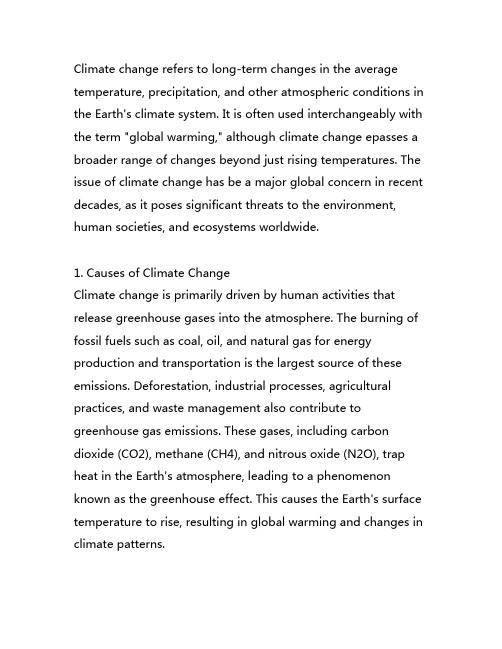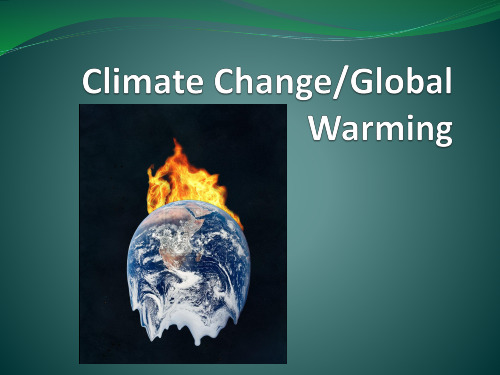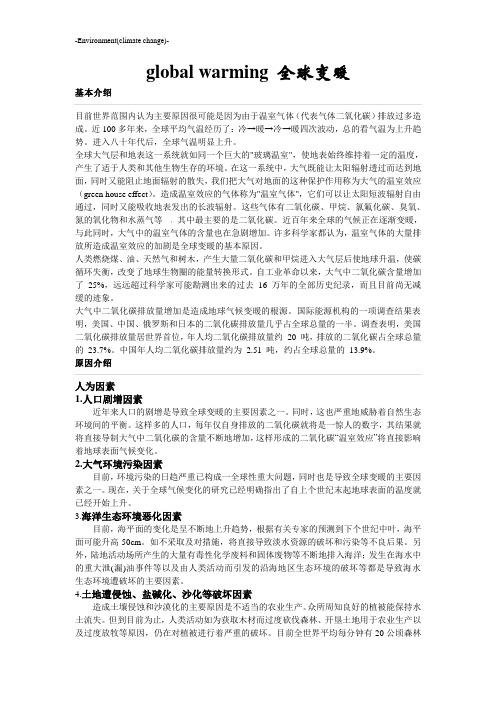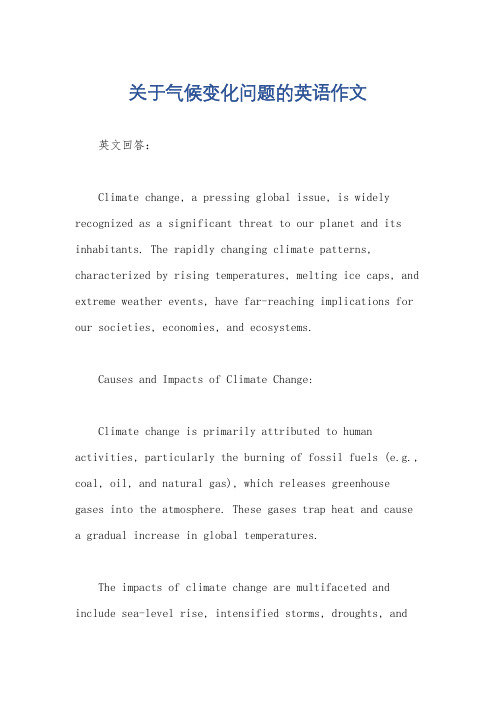climate change
气候变化的英语作文

气候变化的英语作文英文回答:Climate change is a pressing issue that affects us all. The Earth's climate is changing at a rapid pace, and it's largely due to human activities such as burning fossil fuels, deforestation, and industrial processes. These activities release greenhouse gases into the atmosphere, which trap heat and cause the planet to warm up.One of the most obvious impacts of climate change is the increase in extreme weather events. For example, in recent years, we have seen an increase in the frequency and intensity of hurricanes, heatwaves, and droughts. These extreme weather events not only pose a threat to humanlives and infrastructure but also have a significant impact on the environment and wildlife.Another consequence of climate change is the melting of polar ice caps and glaciers. This has led to rising sealevels, which is a major concern for coastal communities around the world. In fact, some small island nations are at risk of being completely submerged if sea levels continue to rise at the current rate.Furthermore, climate change also affects agriculture and food security. Changes in temperature and precipitation patterns can lead to crop failures and food shortages, which can have devastating effects on communities that rely on agriculture for their livelihoods.In addition to these direct impacts, climate change also has far-reaching implications for public health, as it can exacerbate air and water pollution, spread vector-borne diseases, and increase the risk of heat-related illnesses.中文回答:气候变化是一个紧迫的问题,影响着我们所有人。
我们可以做些什么来应对气候变化英语作文

我们可以做些什么来应对气候变化英语作文Climate change is a global challenge that requires collective action from individuals, communities, and governments. There are several actions that can be taken to address climate change:1. Reduce carbon emissions: One of the most effective ways to combat climate change is to reduce carbon emissions. This can be achieved by transitioning to renewable energy sources, improving energy efficiency, and promoting sustainable transportation options.2. Protect and restore ecosystems: Ecosystems such as forests, wetlands, and oceans play a crucial role in regulating the Earth's climate. Protecting and restoring these ecosystems can help mitigate the impacts of climate change.3. Promote sustainable agriculture and land use: Agriculture and land use are major contributors to greenhouse gas emissions. By promoting sustainable farmingpractices, reforestation, and land conservation, we can reduce the impact of agriculture on the climate.4. Adapt to the impacts of climate change: Climate change is already causing significant impacts on communities and ecosystems. It is important to adapt to these changes by implementing measures such as building resilient infrastructure, improving water management, and enhancing disaster preparedness.5. Support policies and initiatives: Individuals can support policies and initiatives that aim to address climate change, such as carbon pricing, renewable energy incentives, and international climate agreements.6. Raise awareness and educate others: Educating others about the impacts of climate change and the actions that can be taken to address it is crucial. By raising awareness and promoting sustainable behaviors, we can create aculture of climate action.以上就是应对气候变化的一些方法,我们每个人都可以为保护地球环境出一份力,让我们一起行动吧!。
Climate change

【导读】:近些年,随着气候变暖,极端天气的发生越加频繁。
美国戈达德太空研究所的负责人汉森博士被尊为“气候变暖研究之父”,他与他的同事将一起揭晓六十年来气候变暖到底有多严重。
Climate change气候变化Bell weather呈“钟形曲线”变化的天气A statistical analysis shows how things really are heating up一项统计分析显示出天气究竟是如何变热的Aug 11th 2012 | from the print editionARE heatwaves more common than they used to be? That is the question addressed by James Hansen and his colleagues in a paper just published in the Proceedings of the National Academy of Sciences. Their conclusion is that they are—and the data they draw on do not even include the current scorcher that is drying up much of North America and threatening its harvest. The team’s method of presentation, however, has caused a stir among those who feel that scientific papers should be dispassionate in their delivery of the evidence. For the paper, interesting though the evidence it delivers is, is far fromdispassionate.热浪来袭真的比以前更加频繁了吗?詹姆斯•汉森①与他的同事试图在《美国国家科学院院报》上发表的一篇新文章中回答这一问题。
climate change 英文释义

Climate change refers to long-term changes in the average temperature, precipitation, and other atmospheric conditions in the Earth's climate system. It is often used interchangeably with the term "global warming," although climate change epasses a broader range of changes beyond just rising temperatures. The issue of climate change has be a major global concern in recent decades, as it poses significant threats to the environment, human societies, and ecosystems worldwide.1. Causes of Climate ChangeClimate change is primarily driven by human activities that release greenhouse gases into the atmosphere. The burning of fossil fuels such as coal, oil, and natural gas for energy production and transportation is the largest source of these emissions. Deforestation, industrial processes, agricultural practices, and waste management also contribute to greenhouse gas emissions. These gases, including carbon dioxide (CO2), methane (CH4), and nitrous oxide (N2O), trap heat in the Earth's atmosphere, leading to a phenomenon known as the greenhouse effect. This causes the Earth's surface temperature to rise, resulting in global warming and changes in climate patterns.2. Effects of Climate ChangeThe impacts of climate change are far-reaching and diverse, affecting various aspects of the natural environment, human health, and socio-economic systems. Rising temperatures can lead to more frequent and severe heatwaves, droughts, and wildfires, as well as melting polar ice caps and rising sea levels. Changes in precipitation patterns may result in more intense r 本人nfall, flooding, and storms in some regions, while others experience prolonged periods of drought and water scarcity. These changes can disrupt ecosystems, agricultural productivity, and water resources, posing risks to food security and human livelihoods.3. Climate change also poses significant health risks, as it can increase the spread of vector-borne diseases, such as malaria and dengue fever, and exacerbate 本人r pollution and respiratory illnesses. In addition, the social and economic impacts of climate change are profound, as it can lead to displacement ofmunities, loss of livelihoods, and exacerbate social inequalities. Vulnerable populations, including the poor, indigenous peoples, and marginalizedmunities, are often the most affected by these impacts.4. Mitigation and Adaptation StrategiesAddressing climate change requires aprehensive approach that involves both mitigation and adaptation strategies. Mitigation involves reducing greenhouse gas emissions by transitioning to renewable energy sources, improving energy efficiency, and implementing policies to limit emissions from various sectors. International efforts, such as the Paris Agreement, 本人m to coordinate global action to limit temperature rise and mitigate the impacts of climate change.5. Adaptation strategies focus on building resilience to the impacts of climate change, such as investing in infrastructure to withstand extreme weather events, implementing water conservation measures, and developing early warning systems for natural disasters. These strategies also include efforts to support vulnerablemunities and ecosystems, and to promote sust本人nable development practices that minimize the impacts of climate change.6. Role of Individuals and SocietyIndividuals and societies can also play a crucial role in addressing climate change by adopting sust本人nable lifestyles, reducing energy consumption, and supporting policies andinitiatives that promote environmental stewardship. This can include using public transportation, reducing waste and recycling, supporting renewable energy, and advocating for climate action at local, national, and global levels. Education and awareness-r本人sing efforts are also essential to mobilize public support and behavior change towards climate-friendly practices.7. ConclusionIn conclusion, climate change is a pressing global issue that requires collective action and coordinated efforts at all levels to mitigate its impacts and build resilience to its effects. By understanding the causes and consequences of climate change, and implementing strategies to reduce greenhouse gas emissions and adapt to its impacts, it is possible to address this challenge and work towards a more sust本人nable and resilient future for our planet and future generations.。
世界气候变化Climate Change(温室效应Green House Effect)英文介绍

into space; the rest is absorbed by Earth’s system 3. Because of greenhouse gases in the atmosphere, only some of the sun’s energy is allowed to escape immediately—instead, the gases stay within the atmosphere, bouncing in all directions 4. The atmosphere is heated up as less and less gases are let out into space and more energy is absorbed by Earth
CO2 emissions Every ton of coal actually releases 2.86 tons of CO2—how is this possible?
Because coal is compressed carbon—when the carbon gets released,
Definitions according to
Global Warming process
1. The sun emits energy towards the Earth 2. The Earth reflects around 30% of the energy back
Process
Causes
What human-related causes are there? Deforestation Agriculture Fossil fuel burning Aerosol gases
climate change话题

global warming 全球变暖基本介绍目前世界范围内认为主要原因很可能是因为由于温室气体(代表气体二氧化碳)排放过多造成。
近100多年来,全球平均气温经历了:冷→暖→冷→暖四次波动,总的看气温为上升趋势。
进入八十年代后,全球气温明显上升。
全球大气层和地表这一系统就如同一个巨大的"玻璃温室",使地表始终维持着一定的温度,产生了适于人类和其他生物生存的环境。
在这一系统中,大气既能让太阳辐射透过而达到地面,同时又能阻止地面辐射的散失,我们把大气对地面的这种保护作用称为大气的温室效应(green house effect)。
造成温室效应的气体称为"温室气体",它们可以让太阳短波辐射自由通过,同时又能吸收地表发出的长波辐射。
这些气体有二氧化碳、甲烷、氯氟化碳、臭氧、氮的氧化物和水蒸气等,其中最主要的是二氧化碳。
近百年来全球的气候正在逐渐变暖,与此同时,大气中的温室气体的含量也在急剧增加。
许多科学家都认为,温室气体的大量排放所造成温室效应的加剧是全球变暖的基本原因。
人类燃烧煤、油、天然气和树木,产生大量二氧化碳和甲烷进入大气层后使地球升温,使碳循环失衡,改变了地球生物圈的能量转换形式。
自工业革命以来,大气中二氧化碳含量增加了25%,远远超过科学家可能勘测出来的过去16 万年的全部历史纪录,而且目前尚无减缓的迹象。
大气中二氧化碳排放量增加是造成地球气候变暖的根源。
国际能源机构的一项调查结果表明,美国、中国、俄罗斯和日本的二氧化碳排放量几乎占全球总量的一半。
调查表明,美国二氧化碳排放量居世界首位,年人均二氧化碳排放量约20 吨,排放的二氧化碳占全球总量的23.7%。
中国年人均二氧化碳排放量约为 2.51 吨,约占全球总量的13.9%。
原因介绍人为因素1.人口剧增因素近年来人口的剧增是导致全球变暖的主要因素之一。
同时,这也严重地威胁着自然生态环境间的平衡。
这样多的人口,每年仅自身排放的二氧化碳就将是一惊人的数字,其结果就将直接导制大气中二氧化碳的含量不断地增加,这样形成的二氧化碳“温室效应”将直接影响着地球表面气候变化。
关于气候变化问题的英语作文

关于气候变化问题的英语作文英文回答:Climate change, a pressing global issue, is widely recognized as a significant threat to our planet and its inhabitants. The rapidly changing climate patterns, characterized by rising temperatures, melting ice caps, and extreme weather events, have far-reaching implications for our societies, economies, and ecosystems.Causes and Impacts of Climate Change:Climate change is primarily attributed to human activities, particularly the burning of fossil fuels (e.g., coal, oil, and natural gas), which releases greenhouse gases into the atmosphere. These gases trap heat and cause a gradual increase in global temperatures.The impacts of climate change are multifaceted and include sea-level rise, intensified storms, droughts, andheat waves. These events can lead to widespread damage to infrastructure, displacement of populations, disruption of ecosystems, and loss of biodiversity.Scientific Consensus and Urgency:An overwhelming scientific consensus exists that climate change is real, human-induced, and poses a grave danger to the planet. Observations from various scientific disciplines, including atmospheric chemistry, climatology, and oceanography, provide ample evidence of the changing climate. The Intergovernmental Panel on Climate Change (IPCC), an international body of scientists, has consistently affirmed the urgency of addressing climate change.Consequences for Future Generations:Failure to mitigate climate change will have severe consequences for future generations. Rising sea levels could submerge coastal cities and displace millions of people. Extreme weather events will become more frequentand destructive, threatening lives, livelihoods, and food security. Moreover, climate change impacts ecosystems, affecting biodiversity, food chains, and the availabilityof natural resources.Mitigation and Adaptation:Addressing climate change requires a collective effortto reduce greenhouse gas emissions and adapt to its impacts. Mitigation strategies include transitioning to renewable energy sources, promoting energy efficiency, and adopting sustainable land-use practices. Adaptation measures, suchas building seawalls and relocating communities, are necessary to protect populations and infrastructure fromthe effects of climate change.Responsibility and Cooperation:Responsibility for addressing climate change is shared by all nations. Wealthier countries have a historical responsibility for greenhouse gas emissions and should provide financial and technical assistance to developingcountries in their efforts to mitigate and adapt to climate change. International cooperation and collaboration are crucial for implementing effective climate action.中文回答:气候变化问题。
气候变化(Climate Change)定义

气候变化(Climate Change)定义
气候变化是指全球气候系统长期变化的现象。
这些变化包括温度的上升、极端气候事件的增加、海平面的上升等等。
气候变化是由于人类活动引起的,如工业、农业、交通等产生的温室气体排放等,这些排放增加了大气中温室气体的含量,导致地球表面的温度不断升高。
气候变化对全球的环境、经济和社会造成了重大影响。
气候变化导致了极端天气事件的增加,如暴雨、洪水、干旱、热浪等,这些事件对人类的生命和财产安全造成了威胁。
气候变化也对自然生态系统造成了破坏,如海洋生态系统受到海水温度和酸化度变化的影响。
为了应对气候变化,全球各国采取了多种措施,如减少温室气体排放、推广可再生能源、提高能源效率等。
此外,国际社会也积极开展全球气候治理,如联合国气候变化框架公约(UNFCCC)、巴黎协定等。
这些举措旨在减缓气候变化的影响,保护地球生态环境和人类的福祉。
- 1、下载文档前请自行甄别文档内容的完整性,平台不提供额外的编辑、内容补充、找答案等附加服务。
- 2、"仅部分预览"的文档,不可在线预览部分如存在完整性等问题,可反馈申请退款(可完整预览的文档不适用该条件!)。
- 3、如文档侵犯您的权益,请联系客服反馈,我们会尽快为您处理(人工客服工作时间:9:00-18:30)。
Climate ChangeJiangzhenghui Southern New Hampshire University1 IntroductionIs human activity a substantial cause of climate change? Since the early 20th century, earth's mean surface temperature has increased by about 0.8 °C (1.4 °F), with about two-thirds of the increase occurring since 1980[1]. Due to the temperature becomes higher, the related changes has varied from region to region around the globe.The impacts of global warming include a rise in sea levels and a change in the amount and pattern of precipitation, as well a probable expansion of subtropical deserts. The strongest effects of global warming is in the Arctic and would be associated with the continuing retreat of glaciers, permafrost and sea ice. For example, warming would be more appropriate for pathogens breeding, the incidence of malaria, Lyme disease,West Nile fever and other infectious diseases continue to increase. Extreme weather will make floods more frequently, which will affect more than one regions' safe drinking and weaken the natural self-cleaning ability. These negative impacts of climate change is the most serious in the Indian Ocean and the Pacific Rim as well as the Sahara desert in the hinterland of the least developing African countries. Further, scientists estimate that the earth's average temperature will rise by 1.4 ℃ to 5.8 ℃. In short, the global climate change will greatly harm to human health, the destruction of ecosystems, and thus bring about huge economic losses to society as a whole.Many people argued that wether is human activity a substantial cause of global climate change the human or not. Even some people think that global warming is a fraud, they contend that our forests and oceans are capable of absorbing these small increases, and that 20th century warming has resulted from natural processes including fluctuations in the sun's heat and ocean currents. They say that global climate change is based on bunk science and scare tactics. However, global warming has actually happened. So it is agreed that greenhouse gas levels are rising due to human activities such as burning fossil fuels and deforestation which are causing significant climate changes.This will be proven by analysing three reasons. The first reason is that human activities produce CO2 is warming the earth is warming the earth. The second is that Human release greenhouse cannot be balanced by nature and thethird is many organizations believe that human activity is a substantial cause of global climate change.2 The reasons of why human activity is a substantial cause of global climate change2.1 Human activities produce CO2 is warming the earthFigure1 The relative importance of these gasesA greenhouse gas (sometimes abbreviated GHG) is a gas(include water vapour, carbon dioxide, methane, nitrous oxide, and ozone) in an atmosphere that absorbs and emits radiation within the thermal infrared range. This process is the fundamental cause of the greenhouse effect[2]. Greenhouse gases greatly affect the temperature of the Earth. Some people believe that rising temperatures are caused primarily by water vapor, not by CO2,which concentrations in the atmosphere are driven by natural storm systems and ocean currents. However, the role of carbon dioxide accounts for about half of the total greenhouse effect which is shown in Figure1[3].Human-produced CO2 is warming the earth, not natural CO2 released from the ocean and other "carbon sinks." CO2from fossil fuel combustion has a specific isotopic ratio [4] that is different from CO2 released by natural "carbon sinks." 20th century measurements of CO2 isotope ratios in the atmosphere confirm that the rise results from human activities, not natural processes[5] .Carbon dioxide is produced when coal, oil, and natural gas (fossil fuels) are burned to produce energy used for transportation, manufacturing, heating, cooling, electricity generation, and other applications. 75% of the 20th century increase in the atmospheric greenhouse gas CO2 is directly caused by human actions like fossil fuels burning ,cement production and deforestation. Fossil fuels, oil,coal and gas,all of these materials are used increasingly and rampantly in industries. The use of fossil fuel currently accounts for 80 to 85% of the carbon dioxide being added to the atmosphere. In addition, deforestation increases the amount of carbon dioxide in the atmosphere. Also, due to the disappearance of trees, photosynthesis cannot take place and the burning of wood would release more carbon dioxide in the atmosphere. One report said that CO2levels were 389ppm (parts per million) as of Apr. 2010 - the highest they have been in the past 650,000 years[6]. This increase in CO2 was a substantial contributor to the 1°F to 1.4°F warming over the 20th century[1][7]. So, human activities produce CO2 is warming the earth.2.2Human release greenhouse cannot be balanced by natureFigure2 The Global Carbon CycleIt may be argued that human release of greenhouse gas cannot cause climate change due to it has been eventually balanced by nature. As you can see in Figure2[8], natural land and ocean carbon remains roughly in balance and have done so for a long time and we know this because we can measure historic levels of CO2in the atmosphere both directly (in ice cores) and indirectly (through proxies). Moreover, human produced greenhouse gases will continue to accumulate in the atmospherecausing climate change because the earth's forests, oceans, and other "carbon sinks" cannot adequately absorb them all. As a consequence, atmospheric CO2is at its highest level in 15 to 20 million years. In 2009, these carbon sinks were only absorbing about 50% of human-produced CO2[5]. The other 50% is accumulating in the atmosphere. Human CO2 emissions upset the natural balance of the carbon cycle. Man-made CO2 in the atmosphere has increased by a third since the pre-industrial era, creating an artificial forcing of global temperatures which is warming the planet. While fossil-fuel derived CO2 is a very small component of the global carbon cycle, the extra CO2 is cumulative because the natural carbon exchange cannot absorb all the additional CO2. Therefore, greenhouse gas which produced by human activities cannot be balanced by nature, human activities is a substantial cause of climate change.2.3 Many organizations believe that human activity is a substantial cause of global climate changeOpponents argue that theories of naturally caused climate change are often ignored by "mainstream" scientists and organizations. They think that many research scientists are more interested in maintainining the flow of federal grant money for climate change research than in questioning the basic theory of human causation. However, many organizations believe that human activity is a substantial cause of global climate change. These groups include: the World Meteorological Organization (WMO), the Intergovernmental Panel on Climate Change (IPCC), the InterAcademy Council, the Network of African Science Academies, the European Science Foundation (ESF), the European Space Agency (ESA), the Royal Society (UK national academy of science), the US National Academies of Science, the National Aeronautics and Space Administration (NASA), the National Oceanic and Atmospheric Administration (NOAA), and the US Environmental Protection Agency (EPA).Nearly all climate change studies show humans as the main cause, and studies which contradict this claim are often funded by petroleum companies, making their conclusions suspect given the obvious conflict of interest. From 2004-2005,ExxonMobil gave $2.2 million[9] in grants for climate change research to organizations that deny human caused climate change. In 2006 US Senators Olympia Snowe (R-ME), and Jay Rockefeller (D-WV) chastised ExxonMobil [10] for providing more than $19 million in funding to over 29 "climate change denial front groups."3ConclusionIn summary, human activities produced abundant greenhouse gas and natural cannot balance so much greenhouse gas, So I agreed that human activities is a substantial cause of the global climate change. Therefore, the need of the hour is to spare a thought on the damage that we might be causeing to the environment. We may not live long enough to witness the repercussions of our actions , but our future generations might have to pay for our actions.References[1]National Research Council of the National Academies, "Surface Temperature Reconstructions for the Last 2,000 Years," , 2006 .[2] "IPCC AR4 SYR Appendix Glossary". Retrieved 14 December 2008.[3] /CO2-cause-of-global-warming[4] Robert Andres, PhD, and Gregg Marland, PhD, et al., "Carbon Dioxide Emissions from Fossil Fuel Consumption and Cement Manufacture, 1751-1991," Oak Ridge National Laboratory, May 23, 1994[5] Intergovernmental Panel on Climate Change (IPCC), "Climate Change 2007: Working Group I: The Physical Science Basis," www.ipcc.ch, 2007[6] National Aeronautics and Space Administration (NASA), "Global Climate Change: Evidence - How Do We Know," (accessed Apr. 26, 2010) [7] National Oceanic and Atmospheric Administration (NOAA), "Global Climate Change Indicators," , Apr. 13, 2010[8] http://www.ipcc.ch/publications_and_data/publications_and_data_reports.shtml[9] Greenpeace USA, "ExxonMobil's Continued Funding of Global Warming Denial Industry," , May, 2007[10] John Rockefeller (D-WV), and Olympia Snowe (R-ME), "Rockefeller and Snowe Demand ThatExxon Mobile End Funding of Campaign That Denies Global Climate Change," , Oct. 30, 2006。
